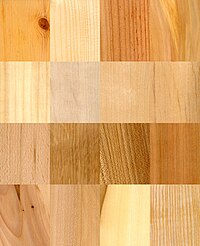
Photo from wikipedia
To achieve a bio‐based economy, it is necessary to consider variability within a feedstock population. We must understand the range of key phenotypic characteristics when selecting economically advantageous genotypes for… Click to show full abstract
To achieve a bio‐based economy, it is necessary to consider variability within a feedstock population. We must understand the range of key phenotypic characteristics when selecting economically advantageous genotypes for domestication in an optimized supply chain. In this analysis we measured cell‐wall composition traits in a large natural variant population of Populus trichocarpa. The results were combined with agronomic growth data from the matching genotype to conduct various techno‐economic analyses, evaluating the impacts of physical and compositional variability and determining the ultimate phenotypic drivers for yield and economic metrics. Here we show that, although ethanol yield per land area per year and minimum fuel selling price were most strongly impacted by tree size, when considering the largest 25% of trees, size and carbohydrate content were nearly identical influences on minimal fuel selling price, highlighting the need to focus on both size and carbohydrate content in selecting economically optimal feedstocks. © 2020 The Authors. Biofuels, Bioproducts, and Biorefining published by Society of Chemical Industry and John Wiley & Sons, Ltd
Journal Title: Biofuels
Year Published: 2020
Link to full text (if available)
Share on Social Media: Sign Up to like & get
recommendations!